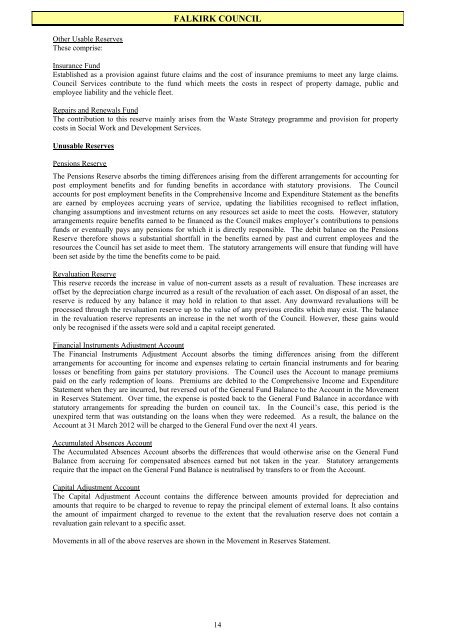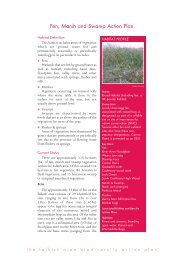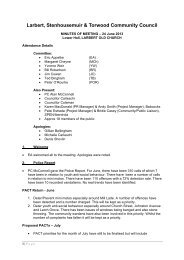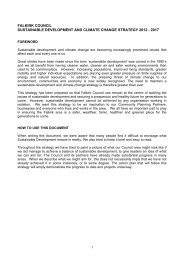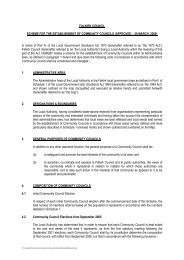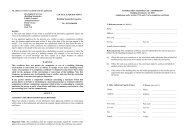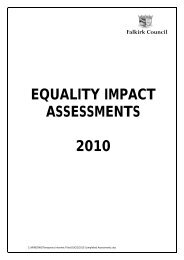2011/2012 audited annual accounts - Falkirk Council
2011/2012 audited annual accounts - Falkirk Council
2011/2012 audited annual accounts - Falkirk Council
You also want an ePaper? Increase the reach of your titles
YUMPU automatically turns print PDFs into web optimized ePapers that Google loves.
Other Usable Reserves<br />
These comprise:<br />
FALKIRK COUNCIL<br />
Insurance Fund<br />
Established as a provision against future claims and the cost of insurance premiums to meet any large claims.<br />
<strong>Council</strong> Services contribute to the fund which meets the costs in respect of property damage, public and<br />
employee liability and the vehicle fleet.<br />
Repairs and Renewals Fund<br />
The contribution to this reserve mainly arises from the Waste Strategy programme and provision for property<br />
costs in Social Work and Development Services.<br />
Unusable Reserves<br />
Pensions Reserve<br />
The Pensions Reserve absorbs the timing differences arising from the different arrangements for accounting for<br />
post employment benefits and for funding benefits in accordance with statutory provisions. The <strong>Council</strong><br />
<strong>accounts</strong> for post employment benefits in the Comprehensive Income and Expenditure Statement as the benefits<br />
are earned by employees accruing years of service, updating the liabilities recognised to reflect inflation,<br />
changing assumptions and investment returns on any resources set aside to meet the costs. However, statutory<br />
arrangements require benefits earned to be financed as the <strong>Council</strong> makes employer’s contributions to pensions<br />
funds or eventually pays any pensions for which it is directly responsible. The debit balance on the Pensions<br />
Reserve therefore shows a substantial shortfall in the benefits earned by past and current employees and the<br />
resources the <strong>Council</strong> has set aside to meet them. The statutory arrangements will ensure that funding will have<br />
been set aside by the time the benefits come to be paid.<br />
Revaluation Reserve<br />
This reserve records the increase in value of non-current assets as a result of revaluation. These increases are<br />
offset by the depreciation charge incurred as a result of the revaluation of each asset. On disposal of an asset, the<br />
reserve is reduced by any balance it may hold in relation to that asset. Any downward revaluations will be<br />
processed through the revaluation reserve up to the value of any previous credits which may exist. The balance<br />
in the revaluation reserve represents an increase in the net worth of the <strong>Council</strong>. However, these gains would<br />
only be recognised if the assets were sold and a capital receipt generated.<br />
Financial Instruments Adjustment Account<br />
The Financial Instruments Adjustment Account absorbs the timing differences arising from the different<br />
arrangements for accounting for income and expenses relating to certain financial instruments and for bearing<br />
losses or benefiting from gains per statutory provisions. The <strong>Council</strong> uses the Account to manage premiums<br />
paid on the early redemption of loans. Premiums are debited to the Comprehensive Income and Expenditure<br />
Statement when they are incurred, but reversed out of the General Fund Balance to the Account in the Movement<br />
in Reserves Statement. Over time, the expense is posted back to the General Fund Balance in accordance with<br />
statutory arrangements for spreading the burden on council tax. In the <strong>Council</strong>’s case, this period is the<br />
unexpired term that was outstanding on the loans when they were redeemed. As a result, the balance on the<br />
Account at 31 March <strong>2012</strong> will be charged to the General Fund over the next 41 years.<br />
Accumulated Absences Account<br />
The Accumulated Absences Account absorbs the differences that would otherwise arise on the General Fund<br />
Balance from accruing for compensated absences earned but not taken in the year. Statutory arrangements<br />
require that the impact on the General Fund Balance is neutralised by transfers to or from the Account.<br />
Capital Adjustment Account<br />
The Capital Adjustment Account contains the difference between amounts provided for depreciation and<br />
amounts that require to be charged to revenue to repay the principal element of external loans. It also contains<br />
the amount of impairment charged to revenue to the extent that the revaluation reserve does not contain a<br />
revaluation gain relevant to a specific asset.<br />
Movements in all of the above reserves are shown in the Movement in Reserves Statement.<br />
14


